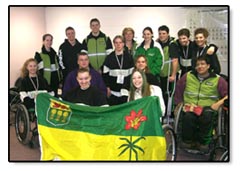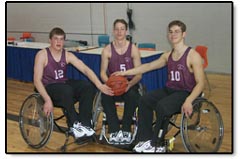
|
Stewart McKeown, the assistant coach for the Saskatchewan
wheelchair basketball team, or "wheelies" as they call
themselves, was extremely happy with his team's win over the
Newfoundland and Labrador team.
On February 18, his twelve-player team won its last game,
with a close score of 42-35. The team consists of six able-bodied
and six disabled players, who are between the ages of 14 and
24. Among these, there are five females. |
Though happy about the win, they were not pleased with their
overall standing because they would return home without a medal.
But they did fight hard and tried their best and according to
McKeown, "We're happy with the win but we probably should
have done better".
Player Jeff Mitchell acknowledges this, but also adds, "We're
a young, fresh team and it's just fun to participate."
Wheelchair basketball is a relatively new sport in the games
-- it was first introduced at the Grande Prairie Games in Jasper
in 1995. Two of the wheelies, Melanie Stare and Michael Bennett,
as well as McKeown who is also disabled, attended those games
and have been playing their sport for many years.
"It's a lot more personal than other sports," says
Bennett, "because it's not all that common."
Fortunately, because of the Canada Games, wheelchair basketball
is getting a lot of attention. "It's kind of nice to have
it in the Canada Games now," says Stare.
With their help, we were able to learn some of the different
rules of this unique sport, especially the point system.
"You have to have a mix of both disabled and able-bodied
players which total fourteen points on the floor," says
McKeown. "The more disabled you are, the fewer points you
are assigned."
One of the members, Mike Cummins, the oldest player on the
team, is an amputee, yet he plays at the 4.5 level because he
has no disability that hinders his balance. As well, female players
and juniors, who are sixteen years old and younger cause the
point value on the court to increase by one. This balance of
male and female, able-bodied and disabled, must add up to fourteen
points. That results in an even balance which makes for a very
competitive and exciting sport. An interesting note is that wheelchair
basketball is one of the few team sports that have both men and
women playing side by side.
|
Curiosity had us killed! We could not understand why an able-bodied
athlete would want to play this type of sport, especially when
regular basketball is so much more easier and popular. McKeown,
however, changed our minds about that.
"It's a completely different game although able-bodied
players must know how to play stand-up basketball well first,"
he says. "Then, it's like riding a bicycle; there's a lot
of tricks and practising to learn how to get better at manoeuvring
the wheelchair." |

Melanie Reader and some of the Saskatchewan
wheelchair basketball team
|
After watching a few games, we started to see why they would
choose this sport. It's an excellent spectator sport with lots
of action. The athletes were having a "ball" while
they played their hearts out.
The players were competitive with each other but also showed
unbelievable sportsmanship towards each other. The Newfoundland
team lost but were excellent sports, and three of their players
posed for us after the game. Whenever disabled athletes lost
their balance on the court, the other athletes would quickly
come to their aid.
An example that we remember well is from a game between Ontario
and Alberta. Even though it was an Ontario player that fell,
an Alberta able-bodied player swiftly hopped out of his chair
to help his fallen opponent back on his wheels. It was acts like
this that really caught our attention.
All of the athletes agree that Newfoundland is an awesome
place to be. They thought that the people were great and had
already decided that they were going to return to Newfoundland
someday.
"Everyone's really nice to us. The volunteers are always
carrying our chairs for us and they don't have to do that,"
comments Chris Clark, one of the able-bodied players on the team.
"People will go to the table and take our trays so that
the wheelchair athletes don't have to carry them around. They're
really nice!"
Jennifer Mitchelmore, the youngest player on the team added,
"I will definitely come back to Newfoundland. I like it
here."
Another teammate of theirs, Jeff Mitchell, definitely agrees.
"It's quite a change from the flatlands of Saskatchewan.
I would probably come back in the spring or summer; I haven't
had a thing to complain about!"
 |
Overall, the wheelchair basketball competition was an inspiration
to all of the spectators, especially to us. To see the strength
of their bodies as well as their courage made us realize that
we can all overcome an obstacle that seems too hard to conquer.
They showed us the spirit of the Winter Games and the determination
that shines from all athletes. Thanks, to all the wheelies, for
teaching us not only the rules of the game, but also what it
takes to be a true athlete! |
|